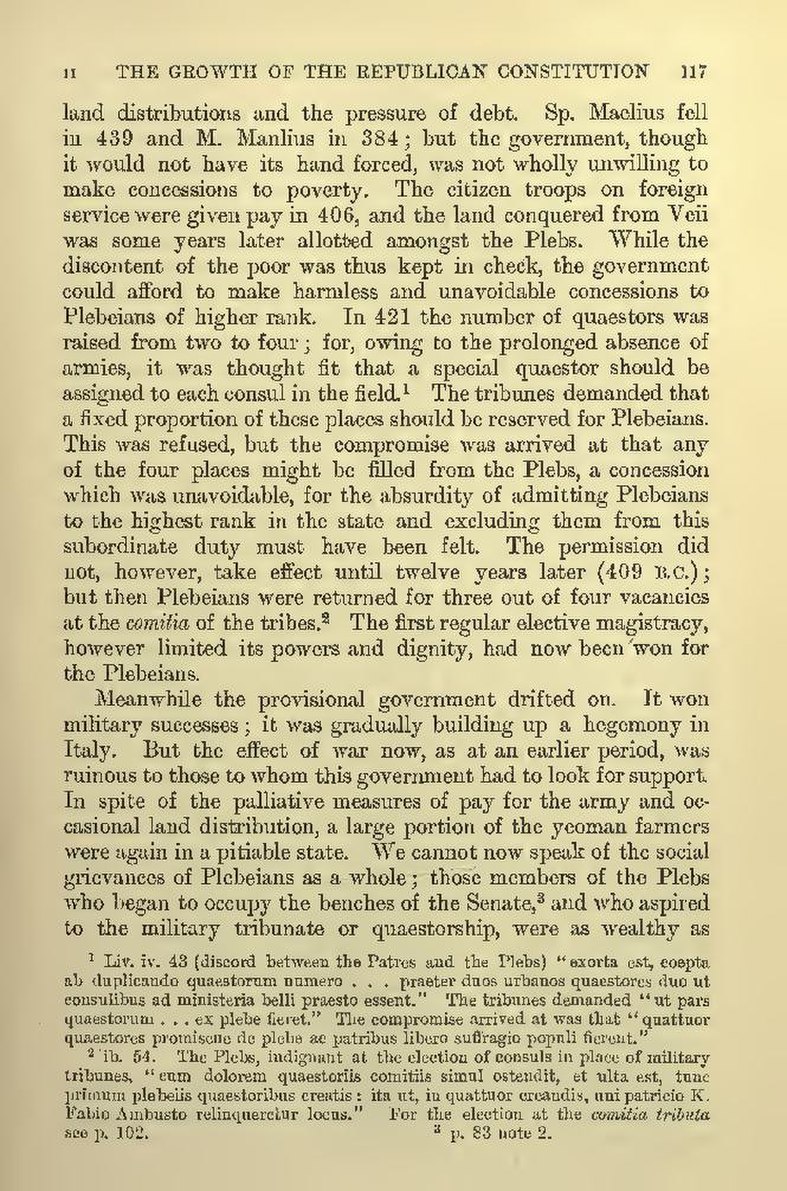land distributions and the pressure of debt. Sp. Maelius fell in 439 and M. Manlius in 384; but the government, though it would not have its hand forced, was not wholly unwilling to make concessions to poverty. The citizen troops on foreign service were given pay in 406, and the land conquered from Veii was some years later allotted amongst the Plebs. While the discontent of the poor was thus kept in check, the government could afford to make harmless and unavoidable concessions to Plebeians of higher rank. In 421 the number of quaestors was raised from two to four; for, owing to the prolonged absence of armies, it was thought fit that a special quaestor should be assigned to each consul in the field.[1] The tribunes demanded that a fixed proportion of these places should be reserved for Plebeians. This was refused, but the compromise was arrived at that any of the four places might be filled from the Plebs, a concession which was unavoidable, for the absurdity of admitting Plebeians to the highest rank in the state and excluding them from this subordinate duty must have been felt. The permission did not, however, take effect until twelve years later (409 B.C.); but then Plebeians were returned for three out of four vacancies at the comitia of the tribes.[2] The first regular elective magistracy, however limited its powers and dignity, had now been won for the Plebeians.
Meanwhile the provisional government drifted on. It won military successes; it was gradually building up a hegemony in Italy. But the effect of war now, as at an earlier period, was ruinous to those to whom this government had to look for support. In spite of the palliative measures of pay for the army and occasional land distribution, a large portion of the yeoman farmers were again in a pitiable state. We cannot now speak of the social grievances of Plebeians as a whole; those members of the Plebs who began to occupy the benches of the Senate,[3] and who aspired to the military tribunate or quaestorship, were as wealthy as
- ↑ Liv. iv. 43 (discord between the Patres and the Plebs) "exorta est, coepta ab duplicando quaestorum numero . . . praeter duos urbanos quaestores duo ut consulibus ad ministeria belli praesto essent." The tribunes demanded "ut pars quaestorum . . . ex plebe fieret." The compromise arrived at was that "quattuor quaestores promiscue de plebe ac patribus libero suffragio populi fierent."
- ↑ ib. 54. The Plebs, indignant at the election of consuls in place of military tribunes, "eum dolorem quaestoriis comitiis simul ostendit, et ulta est, tunc primum plebeiis quaestoribus creatis: ita ut, in quattuor creandis, uni patricio K. Fabio Ambusto relinqueretur locus." For the election at the comitia tributa see p. 102.
- ↑ p. 83 note 2.
